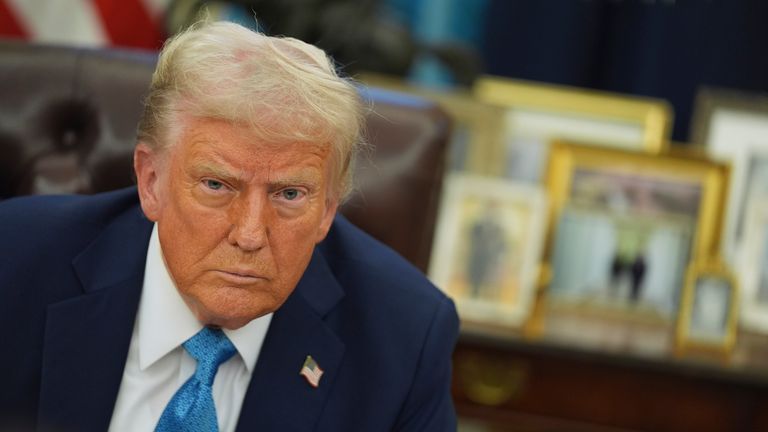Trump’s Daring Decision Sparks Debate: The Polarizing Change to USAID
In a bold and unexpected move, President Donald Trump has sparked widespread controversy with his decision to potentially restructure the United States Agency for International Development (USAID). This move came to light following an incident on Friday when the USAID website suddenly went offline, fueling intense speculation. Critics, especially those within the Democratic Party, have voiced their alarm, suggesting that Trump’s plans to move USAID under the control of the State Department could mark a dramatic shift in U.S. foreign policy, or even result in the agency’s dissolution. While some conservative figures have supported the idea, others view it as a serious threat to national security and global humanitarian efforts.
The Beginning of the Storm: USAID’s Website Goes Dark The tension began when the USAID website unexpectedly went offline, triggering immediate speculation. Some observers thought this might be an indication of an upcoming restructure, possibly with President Trump consolidating the agency’s functions under the State Department. There were even rumors suggesting that the agency could be entirely dissolved. USAID, established in 1961 under President John F. Kennedy, has long been a cornerstone of U.S. foreign aid, helping developing nations with vital programs aimed at addressing health crises, promoting education, supporting economic development, and combating hunger. However, under the Trump administration, the future of the agency has become a point of serious debate.
Democratic Reaction: Worries of a Global Retreat Democratic lawmakers were quick to react, particularly Senate Minority Leader Chuck Schumer, who expressed concern over what he saw as Trump’s potential “purge” of USAID employees. Schumer argued that dismantling the agency would harm U.S. national security and global interests, particularly in health and international stability. His counterpart, Connecticut Senator Chris Murphy, echoed these sentiments, warning that removing USAID would create a power vacuum, allowing rivals like China and Russia to gain influence in developing regions. Murphy painted a grim picture, suggesting that cutting off U.S. foreign aid would lead to devastating consequences, such as the deterioration of anti-terrorism efforts and worsening humanitarian crises.
While these reactions may seem alarmist to some, they reflect a deep concern among Democrats about the U.S. retreating from its role as a global leader in humanitarian and development work. For many in the party, USAID has been an important tool to maintain influence in strategic regions where U.S. adversaries are vying for control.
Conservative Support: A Step Toward Fiscal Responsibility On the other side of the aisle, conservatives have largely celebrated Trump’s reported decision. Kentucky Senator Rand Paul, a long-time critic of U.S. foreign aid, was quick to commend the move. Paul has long advocated for reducing foreign aid, arguing that U.S. taxpayer dollars should be focused on domestic needs rather than international projects. For some on the right, cutting or eliminating USAID is seen as a step toward fiscal responsibility and a more “America First” approach to foreign policy.
Some conservatives, including former CBS News reporter Lara Logan, have also suggested that USAID has served as a vehicle for U.S. intelligence operations in the past, using taxpayer resources for non-humanitarian purposes. These views underscore a broader distrust of the agency’s role and effectiveness.
Trump’s Motivation: Efficiency or Global Withdrawal? So, why is President Trump pursuing such a dramatic change? While the full scope of his intentions remains unclear, there are a few theories. One possibility is that Trump sees USAID as an outdated bureaucracy that no longer serves its intended purpose. By bringing it under the State Department, the Trump administration might hope to create a more streamlined approach to foreign aid and policy.
Another potential factor is Trump’s general approach to foreign policy. Throughout his presidency, he has frequently criticized large foreign assistance programs, particularly those benefiting countries with whom the U.S. has limited strategic ties. Trump has often emphasized a desire to reduce U.S. involvement in global issues and to refocus resources on priorities that directly benefit America.
Legal Questions: Can USAID Be Disbanded? The legality of such a move is in question. Some legal experts argue that it would be difficult, if not impossible, for Trump to unilaterally dissolve USAID, as the agency was established by executive order under President Kennedy. However, others suggest that restructuring it within the State Department could potentially be done through executive action, without needing extensive Congressional approval.
The Road Ahead: Uncertainty and Debate As the debate continues, the future of USAID remains uncertain. The decision to either move the agency or eliminate it entirely will have significant implications for U.S. foreign policy and its relationships around the world. On one hand, critics argue that such a change could weaken the U.S.’s ability to exert global influence and undermine its humanitarian efforts. On the other, proponents argue that a restructuring would make foreign aid more efficient and aligned with U.S. national interests.
With no clear resolution in sight, the conversation about the future of USAID is likely to continue, raising critical questions about America’s role in global development and diplomacy in the years to come.
